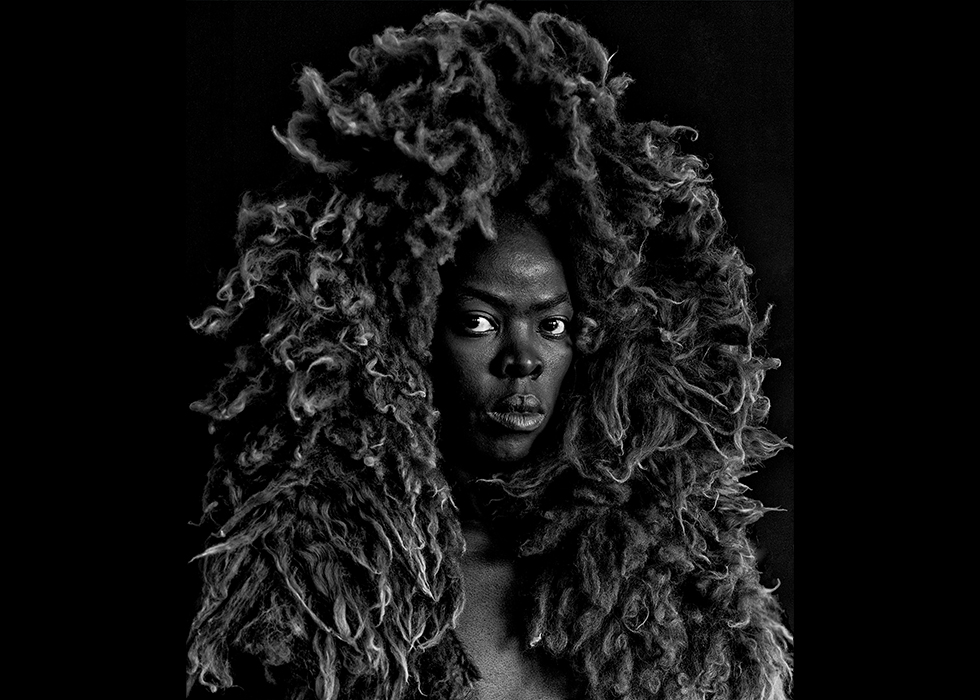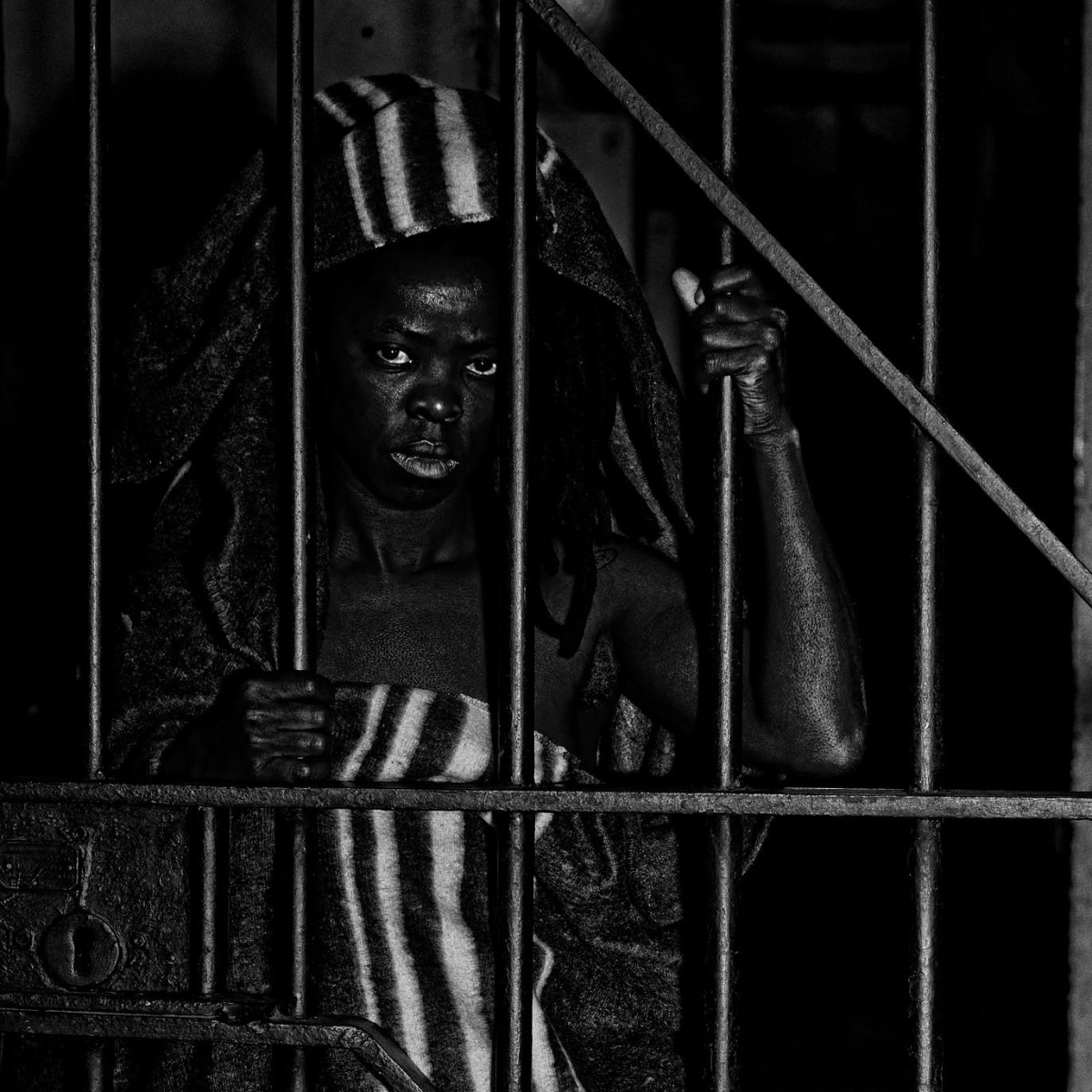PENETRATING THE IMPOSSIBLE SPACE
ARTTHROB / 2017
“How many black people appear on covers of magazines? And how do they appear without being exoticised? And what sort of headlines do we get, as black people, if appearing in the media at all?” ask Zanele Muholi, South African artist and visual activist.
Speaking to Muholi about Somnyama Ngonyama, her latest show at Autograph ABP in London, she embodies the strength, passion and nuanced politics that are visible in the work. She confronts discrimination head on, using her own body to question the representation of black bodies throughout history, and in today’s world.
Muholi is well-know for Faces and Phases, an ongoing series of portraits of the black LGBQTI community in South Africa. The people featured in Faces and Phases, and the community they represent, are regularly victims of hate-crimes, abuse and discrimination. Faces and Phases celebrates these individuals, bringing with it a sense of pride that is so integral to marginalised queer communities, even in the face of danger. In Somnyama Ngonyama, Muholi turns the camera towards herself, tackling these and other important issues of race, representation and history, through her own body.
Asked when she decided to use herself as the subject of her work, she explains: “As a person who has been documenting black LGBQTI for more than ten years, there are a lot of challenges that I face along the way. I’m dealing mostly with pain, and hate crimes, and documenting all those events. For some reasons I was losing myself along the way, dealing with so much trauma; I could see that I was carrying a lot of baggage. So I thought to myself: it’s important for me to deal with it in an amicable way. I therefore focused on the self – as my own means of articulation, dealing with the pain, and also trying to connect what was going on here, at home, and also things I was encountering.
“My first work [Faces and Phases] was focused on gender politics and queer politics, that’s how I’m known in art circles. This particular one [Somnyama Ngonyama] deals with the self, self representation, and also racial politics. So I could say, all that I do becomes autobiographical. I can’t speak of this work without speaking of the experience I encounter as I cross different borders; the racism that persists and the undermining that is layered with all that I am.
“I am also thinking of other cases in history, which I reference in the work. I use material, and look at my own body as a material as well, when violated, when murdered… when brutally violated in many ways. So I just thought, let me deal with me; let me focus or contract my own pain, let me speak or express this anger and use my own body. I didn’t want to expose another person to this pain.”
There is pain evident in Somnyama Ngonyama, but there is also strength, confrontation, and contemplation. Muholi explores the multiple facets of her identity as a black female artist and activist in today’s world, as well as her connection to history and its many racial and political narratives.
In Bayephi I (Constitution Hill, Johannesburg, 2017), Muholi looks out at us from behind the bars of prison, dressed in recognisable SAPS (South African Police Service) blankets. She confronts the difficult relationship between black South Africans and the SAPS, particularly during apartheid.
In Sandile I (Room 296, Fjord Hotel, Berlin, 2017) we see Muholi from the side, unadorned and looking down. She is contemplative and vulnerable, without any of the symbolic objects and props in many of the other portraits. In Basizeni XI (Cassilhaus, North Carolina, 2016) she dons neck-wear and a headdress made from rubber tubes, her expression strong, not meeting our gaze. The Exhibition Newspaper (a thoughtful and poignant complement to the show published by Autograph) explains that this portrait is a tribute to Muholi’s older sister, Basizeni Muholi (1956 – 2016).
Together, the works that make up ‘Somnyama Ngonymana’ reveal multitudes about Muholi’s practice. The titles are all in isiZulu and then translated into English. These isiZulu titles strongly root the work in Muholi’s South African heritage, even when she is abroad. The locations of the works vary, from Durban and Johannesburg to Italy, Oslo and Ohio. These different settings give us insight into Muholi’s travels, and how her experience of moving around the world influences her work.
The costumes and props in the works offer another layer of meaning. Some of them are instantly recognisable – like the pegs and metal scourers Muholi uses to make head-dresses in Bester V and Bester I. They appear to reference the domestic work that many black women were (and are) engaged in to support their families. (These works are named after Bester Muholi, 1936–2009, Zanele Muholi’s mother). As a South African viewing Muholi’s work, you also immediately pick up on references like Marikana in Thulani II (Parktown, 2015) – the massacre perpetrated by the SAPS, who opened fire on a group of striking miners, killing 34 people and wounding at least 78. The work shows Muholi bare-chested, wearing a hard hat and goggles, looking straight of the image and at the viewer.
“Who has written our visual histories in Africa? I question that. Who had the right to even publish those black faces that are caricatured on a daily basis?
Renee Mussai, Senior Curator at Autograph ABP, comments on the importance of Muholi’s gaze in the works on show: “A majority of the portraits in the downstairs gallery [of Autograph] are dominated by Muholi’s intense, penetrating gaze, creating an overwhelming, almost inescapable plethora of intense simultaneous, reciprocal gazing. This forces the viewer into a dialogue with the work, rather than passively looking at – or consuming – Muholi’s black figure.”
There is a long and troubled history of ethnographic photographers documenting black people without their explicit consent, removing their agency and subjectivity by treating them as objects of curiosity, rather than individuals with lives, names and histories. Muholi’s work counters this – the photographer and the subject are one, personal agency is reclaimed. Muholi asks:“Who has written our visual histories in Africa? I question that. Who had the right to even publish those black faces that are caricatured on a daily basis? Who then tell us about Africa? Who writes Africa, who photographs Africa, who gets to be heard in Africa?
“It’s beyond the black face that you see mounted on the wall. It’s political, just the existence in which I use this photography, as means of resistance. It’s not just for show, it’s not about fine art, it’s deeper than that. It’s about politics of representation, politics of existence, politics of blackness and race. And it depends on who is listening, and who is willing to listen.”
It may come as a surprise to some that for an artist as celebrated as Zanele Muholi — who has been winning awards since 2009 and has shown all over the world — Somnyama Ngonyama is Muholi’s first solo show in London. As the artist explains, the lack of representation of black artists in European and British cultural spaces is one of the many subject that Somnyama Ngonyama addresses.
“For one, it’s about penetrating the impossible space. It’s very rare that you find black artists penetrating the spaces – in which they bring forth their own bodies, and speak of the politic of being black in those spaces. Especially in the height of racism around the world, in which you read about what is happening in America and Europe. That exhibition [Somnyama Ngonyama]is aimed at encouraging black artists to say that their voices and their bodies are worthy; they deserve to be in those spaces. And to create a new dialogue that speaks to their contemporaries – this generation. To not run away from the fact that we still lack spaces in which black artists could showcase their work.”
It is this lack of representation that Autograph ABP, the organisation showing ‘Somnyama Ngonyama’ in London, consistently aims to counter. Renée Mussai, Senior Curator at Autograph, explained the link between Muholi’s visual activism and the goals of Autograph: “There are few contemporary practitioners whose work is more closely aligned with Autograph ABP’s mission, in addressing critical politics of race, representation and human rights in relation to the black body, through photography.”
Mussai goes on to explain the aims for the exhibition, in relation to Muholi’s visual activism: “We hope that the exhibition brings audiences closer to some of the many concerns her powerful self-portraits address, to think more deeply, differently and critically when looking at her work and the politics of representation. Each and every portrait in the series makes a profound statement about our position and responsibility as human beings, about representational politics, and about how we interact with each other, and with the environment – across time, and place.”
At a time when racism and bigotry are increasingly blatant across the world, Muholi’s bold and highly personal work is a vital opposing voice.
By Siobhan Keam for Artthrob


